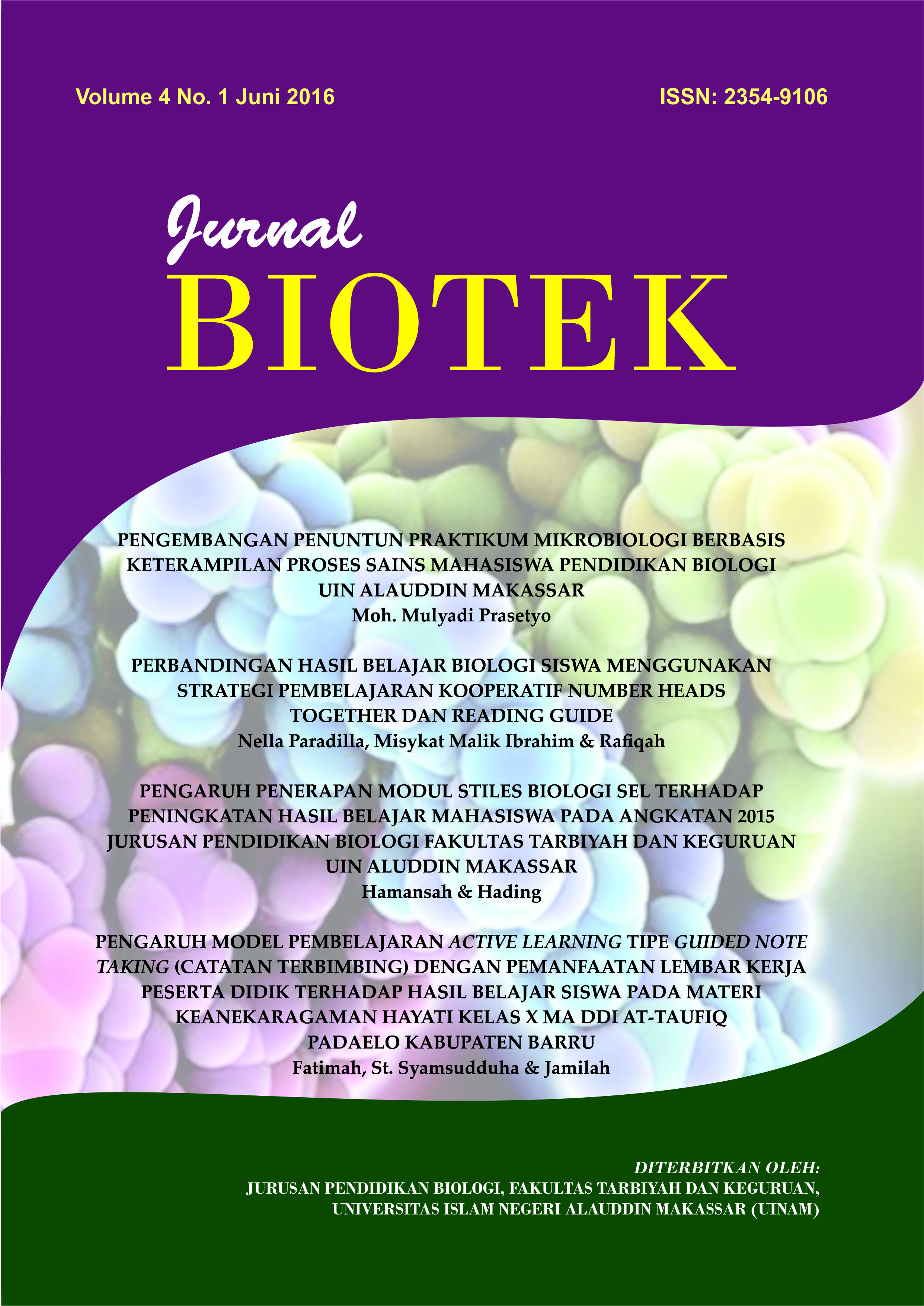PERBANDINGAN METODE PEMBELAJARAN PROBLEM BASED LEARNING DENGAN METODE MIND MAPPING TERHADAP HASIL BELAJAR BIOLOGI
Abstrak
The objectives of this research were to determine the outcome differences learning of students who are taught by the teaching mthods Problem Based Learning (PBL) and Mind Mapping in digestive system material of the student in Class XI SMAN 1 Bangkala Western district.jeneponto.
This research used quasi Experimental. The research design was nonequivalent control gruop design. The population was all second year student of SMA 1 Bangkala Barat Kabupaten Jeneponto. The population of this research was all students of class XI SMAN 1 Bangkala western district.jeneponto. The research sampel was class XI IPA2 as the first experimental class XI IPA1 as the second experimental class. Data were collected using achievement test in the form of pretest and posttest. Data were analyzed using descriptive analysis techniques and inferential statistical analysis techniques.
Analysis of the data showed the learning outcomes student class XI SMAN 1 Bangkala western district.jeneponto. was in digestive system material taught through; the first method of learning (PBL) is in the medium categori, with a percentage of 35 % of the 20 learners and the average value of 79. While the outcomes of Mind Mapping learning methods was in middle category, with an average value of 68 with increased 11. The results of the analysis of hypothesis testing using t-test diperoles thit value = 3.489 and the value ttab with dk= 2.02438. were the value of thit>ttab so H-0 rejected, H1 accepted. Thus there are differences in learning outcomes of students who are taught through learning methods Problem Based Learning (PBL) with Mind Mapping on the material digestive system in class XI sman 1 Bangkala western district Jeneponto##plugins.generic.usageStats.downloads##
Referensi
Busan, Toni. (2007). Buku Pintar Mind Map. Jakarta: Gramedia Pustaka Utama.
Fahmanisa, Ulfa. (2002). Tips Memahami Peserta Didik. Bandung: Boenz Enterprise.
Herdian (2013). “Model Pembelajaran Mind Mapping” Online. (diakses di. http://D:Andry/2013/01/ model pembelajaran Mind Mapping pada 08 jannuari 2013).
Huda, Miftakhul. (2009). Model-Model Pengajaran Pembelajaran. Bandung: Pustka Pelajar.
Husamah. (2013). Outdoor Learning. Jakarta: Prestasi Pustaka
Kadir, Abdul dkk, (2012). Dasar-Dasar Pendidikan . jakarta: Kencana.
Nurhadi, dkk. (2004). Pembelajaran Kontekstual dan Penerapan dalam KBK. Malang: UM Press.
Nuryani. (2011). Strategi Belajar Mengajar. Malang: UNM Press.
Sepia. (2007). Merai Bahagia dan sukses Melalui IQ,EQ,SQ,PQ,AQ, Online. (Diakses dari Internet Tanggal 13/06/2007.www.google Com. 2007)
Suprijono, Agus. (2011). Coopertive Learning. Yogyakarta: Pustaka Pelajar.
Trianto. (2010). Mendesain Model Pembelajaran Inovatif-Progresif. Jakarta: Kencana.
Authors who publish with Jurnal Biotek agree to the following terms: Authors retain the copyright and grant Universitas Islam Negeri Alauddin Makassar right of first publication with the work simultaneously licensed under a Creative Commons Attribution License (CC BY-SA 4.0) that allows others to share (copy and redistribute the material in any medium or format) and adapt (remix, transform, and build upon the material) the work for any purpose, even commercially with an acknowledgement of the work's authorship and initial publication in Universitas Islam Negeri Alauddin Makassar. Authors are able to enter into separate, additional contractual arrangements for the non-exclusive distribution of the journal's published version of the work (e.g., post it to an institutional repository or publish it in a book), with an acknowledgement of its initial publication in Universitas Islam Negeri Alauddin Makassar. Authors are permitted and encouraged to post their work online (e.g., in institutional repositories or on their website) prior to and during the submission process, as it can lead to productive exchanges, as well as earlier and greater citation of published work (See The Effect of Open Access).

This work is licensed under a Creative Commons Attribution-ShareAlike 4.0 International License.



